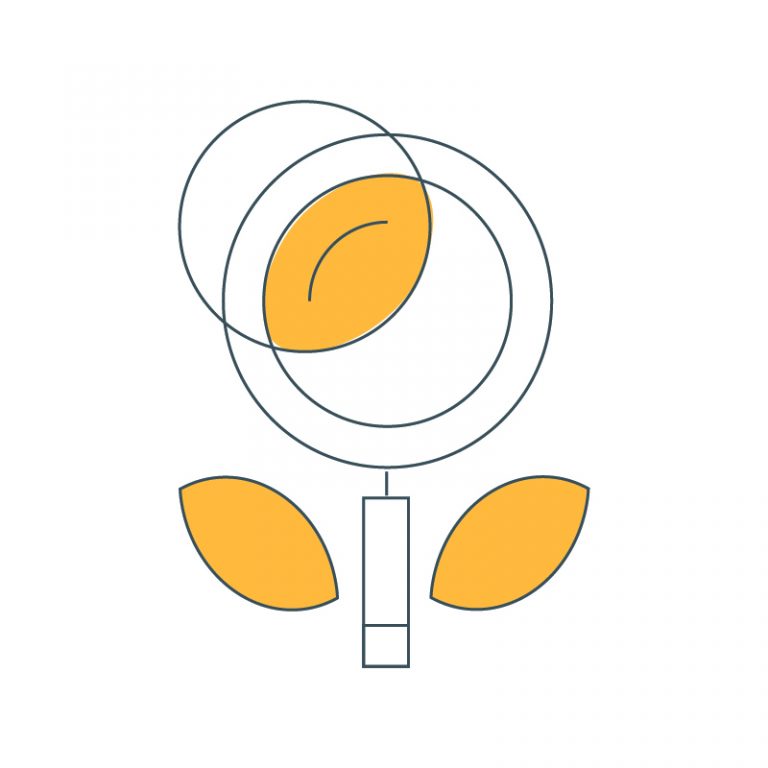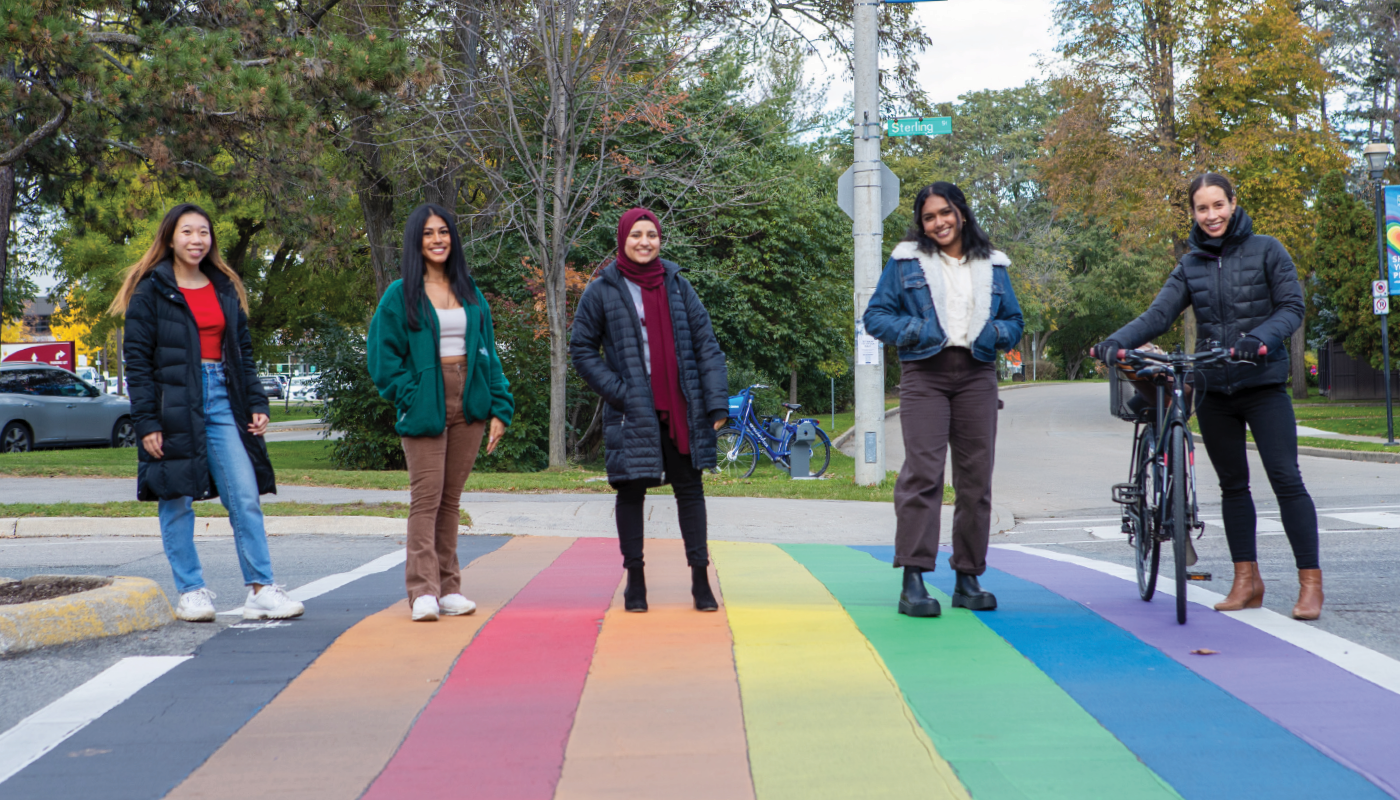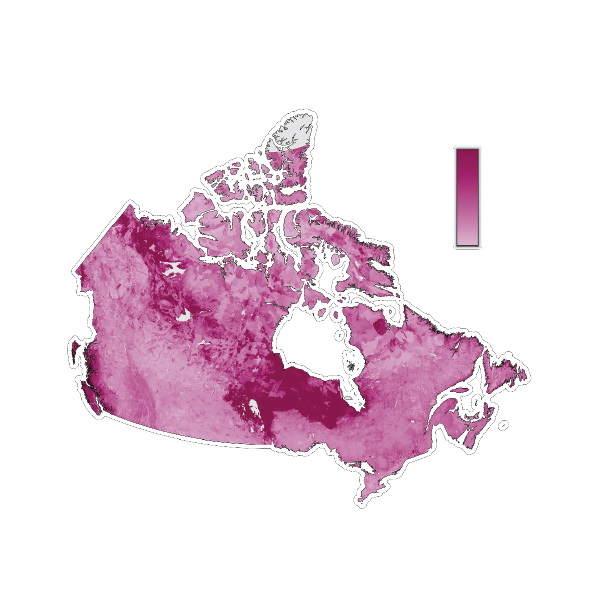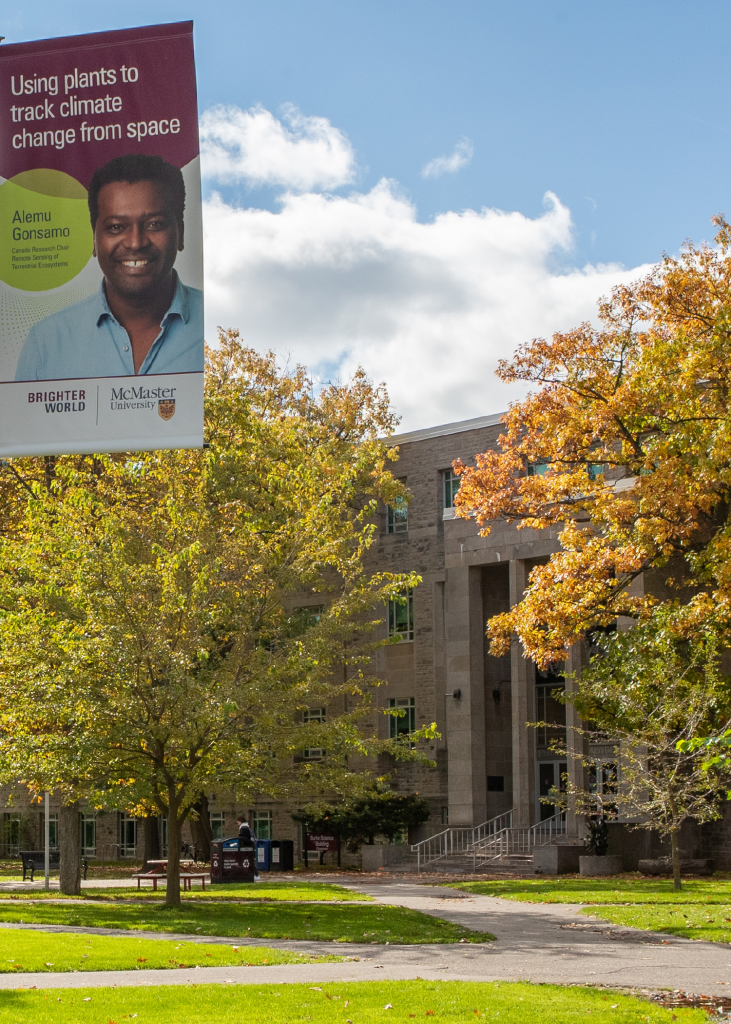Teaching, Learning and Research
Researchers, Hossein Medhi and Tabitha Mizra, in the Desjardins Canal in Dundas studying the effects of human activities on the health of freshwater and marine ecosystems.

McMaster is committed to supporting sustainable research, teaching and learning. In this year’s report, we share a selection of the progress our researchers made in addressing the most pressing challenges facing our climate and planet. We also share examples of how our students have been active partners in developing a living laboratory for sustainability on campus in the 2021/22 academic year.
- Sustainable Research
- Interdisciplinary Learning
- Campus as a Living Laboratory
- Digital Learning and Environment
Information Box Group

Undergraduate students Grace Kuang, Ramitha Muralitharan, Maryam Rehman, and Michelle Mariaprabhu, from the Student perceptions of sustainability research project team, with Kate Whalen, Associate Director, Academic Sustainability Program.
Sustainable Research: Environmental scan
An environmental scan led by Jessica Achebe, a postdoctoral fellow in the Faculty of Engineering and Sally McKay, a postdoctoral fellow in the School of the Arts paints a picture of an active sustainability research community at McMaster and provides an inventory of research across areas such as climate change, water, energy, and community justice. The report notes that McMaster researchers are collaborating on multi-disciplinary teams and believe in the importance of integrating Indigenous perspectives as core principles of planetary health. The researchers put forth a recommendation for a hub of sustainability research, designed to maximize connections across disciplines, aligning with the strategic goal of increasing research collaboration to tackle sustainability related challenges.
Interdisciplinary Learning: Student perceptions of sustainability
Students from interdisciplinary backgrounds enrolled in a fourth-year Academic Sustainability Programs (ASP) course partnered with the Office of Sustainability on a project to better understand how students perceive McMaster’s sustainability practices. Interviews were conducted with highly engaged undergraduate students from the Student Sustainability Ambassadors Program (SSAP) and recommendations were presented based on a qualitative thematic analysis. The results highlighted that students want to be more aware of sustainability initiatives on campus and more involved in sustainability related decision-making. The findings show that the students interviewed want the university to better connect sustainability goals with progress made along the way. The learnings from this report will be incorporated into future planning by the Office of Sustainability. The report can be found on ASP’s website.
Information Box Group

The West Campus Eco-Art project reimagines Parking Lot M with stencilled art of key species of flora, fauna, historic symbols, all painted along blue lines that represent the former routes of Coldwater Creek. (Photo by Colin Czerneda, Faculty of Humanities)
Campus as a Living Laboratory:
Renaturalizing of parts of west campus
McMaster invites all university community members to think of campus as a place to pilot new sustainability related ideas and projects. The Watershed Trust has evolved over the last decade as artists, professors, and students collaborated with renowned artist Patricia Johanson to propose ways to redesign a part of McMaster’s west campus as a mosaic of wetlands, while still creating space for the university’s logistical needs, like parking and outbuildings. In 2021, a feasibility study measured available water for the project and the School of the Arts painted on the asphalt, mapping one of the creek’s routes from over the last century. The Watershed Trust is co-led by the Faculty of Humanities and the Faculty of Science and allows for opportunities for experiential learning and integrated campus community projects in the west campus. Plans proposed for the west campus will be explored in more detail through the Campus Master Planning process, which began in 2022.
Digital Learning and Environment: Optimizing energy use in the classroom
Innovative technology is making McMaster’s buildings smarter and more sustainable. In 2022, McMaster University was awarded $200K CAD in funding from Cisco’s Country Digital Acceleration program, with plans to use digital systems to develop a proof of concept that will automate and synchronize building systems. By integrating the heating, cooling, lighting, audio visual and access systems in classrooms and synchronizing with the classroom scheduling system for activation during scheduled times, McMaster will conserve energy and improve the experience and comfort of everyone in the classroom. Another one of the goals is to collect real-time metrics to improve classroom optimization, meaning that classroom energy use will match the comfort needs of the fluctuating number of students in classrooms throughout the day, saving more energy over time.

![]()
Spotlight:
McMaster researchers use machine learning to map carbon storage across Canada
In the fall of 2021, a WWF Canada research study led by McMaster researchers on the climate impacts of disturbing enormous amounts of carbon captured in soil across Canada was shared at COP26, the United Nations Climate Change Conference in Scotland. The research analysis, conducted by Alemu Gonsamo, assistant professor and Canada Research Chair in Remote Sensing of Terrestrial Ecosystems and Camile Sothe, postdoctoral researcher, shows that 21.1 billion tonnes of Canada’s carbon stocks are stored in its forests, much of it in the soil below ground.
A map of these forests reveals that the area around Hudson’s Bay has the highest density of carbon captured in the soil and therefore would do the most harm to the climate if disturbed and released into the atmosphere. Since there is no way to take physical soil samples from all of Canada, the two McMaster researchers used satellite data and machine learning to estimate carbon storage density from across the country.
The study was reported in national newspapers, where Gonsamo was quoted as saying “the biggest finding is that the amount of carbon in the top one metre of soil is so huge compared to other estimates,” adding that it exceeds the amount stored in the Amazon rainforest.
 Total terrestrial ecosystem carbon storage across Canada. Darker shades represent larger carbon stocks. The study revealed significant carbon stores in coastal British Columbia’s forests, the boreal forest and the Hudson and James Bay Lowlands. Source: Sothe et al. 2022
Total terrestrial ecosystem carbon storage across Canada. Darker shades represent larger carbon stocks. The study revealed significant carbon stores in coastal British Columbia’s forests, the boreal forest and the Hudson and James Bay Lowlands. Source: Sothe et al. 2022



